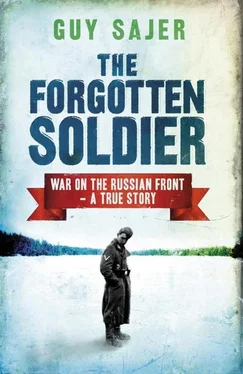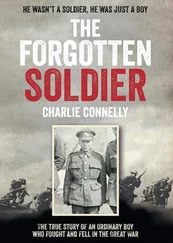A network of loudspeakers which had been set up throughout the square disseminated a short lecture from the High Command. The lecture pointed out that even a victorious army had to accept deaths and casualties, and that our role as a convoy unit was to carry, at whatever the cost and despite all the hardships, which the High Command thoroughly recognized, the food, munitions, and materiel the combat troops required. Our convoy, by any means available, had to reach the banks of the Volga, so that von Paulus could continue to wage his victorious battle. One thousand miles separated us from our destination, and we hadn’t a moment to spare.
We left after the midday meal. I found myself, separated from my closest friends, aboard a five-and-a-half-ton D.K.W. loaded with heavy automatic weapons. The road leaving the city was well ploughed, and we rolled along at a brisk pace. There must have been road gangs working around the clock. The snow banks on either side of the road were nearly twelve feet high. We passed a signpost bristling with pointers. On the sign indicating the road we took I read NACH PRIPET, KIEV, DNIEPER, KHARKOV, DNIEPROPETROVSK.
Our troops had rounded up everyone capable of holding a shovel, and we were able to cover nearly one hundred miles in good time. We soon reached the summit of a hill from which we could see the immensity of the Ukraine stretching into the distance under a yellowish gray sky.
The ten or twelve vehicles ahead of us had suffered a serious reduction in speed. Ahead of them, a company of soldiers were busily engaged in moving snow. A heavy truck was pushing a sled fitted with a kind of ventilator which blew out the snow in all directions. Beyond lay an infinity of immaculate snow nearly three feet deep. (Heavy snowfalls buried the road so completely after the passage of each convoy that we needed a compass to dig it out again.) Our commanding officer and his noncoms had walked a short distance out onto the upswept snow, sinking in over the tops of their boots, and were scanning the horizon, wondering how they could possibly proceed through all that soggy cotton. Inside our D.K.W., with all the windows shut, I and my traveling companion were relishing the warmth of our running engine.
But soon they were ordering us out of our machines and distributing snow shovels. As there weren’t enough to go round, our noncoms told us to use anything we could lay our hands on. I saw men digging with boards, helmets, big serving platters….
With two other fellows I was pushing against the tailgate of a truck which we had detached, hoping to use it as a crude sort of snow plough. The blast of a feldwebel’s whistle interrupted our disorganized labor.
“What do you think you’re proving over there? Come along with me; we’ll go and round up some manpower. Bring your guns.”
I felt a surge of jubilation, which I kept well-hidden, as I inwardly thanked the idiots who had devised our hopeless procedure. I preferred almost anything to shoveling snow. We followed the feldwebel. I had no idea where he hoped to find more manpower. We had only passed two deserted villages since leaving Minsk. With our guns slung, our little group split off from the track the trucks had traced in the snow, and headed north. We sank in over our knees with every step, which made progress extremely difficult.
For ten minutes I did my best to follow the feldwebel, who was about fifteen feet ahead of me. I was gasping for breath, and I could feel the sweat beginning to trickle down my spine under the heavy cloth of my coat. My breath projected long streams of vapor, which vanished instantly in the icy air. I kept my eyes glued to the feldwebel’s deep footprints, trying to step exactly into them, but as he was bigger than I, this meant that every step was a leap. I deliberately avoided looking at the horizon, which seemed so far away. A thin screen of birches soon hid the convoy from us.
Ludicrous in our smallness, we continued forward into the immensity of white. I was beginning to wonder where our noncom thought he would find his famous manpower. We had been exhausting ourselves in this way for nearly an hour. Suddenly, in the absolute quiet, we heard a rumbling sound which was growing steadily louder. We stopped.
Our sergeant limited himself to the observation that we hadn’t much further to go, and then added that it was a pity we would miss this one.
I didn’t really understand what he was talking about, but the noise was becoming increasingly clear. To our left I caught sight of a black line stretching across the snow. A train! We were approaching a railway line. I still didn’t see what a train could do for us. Would they take our cargoes on board?
The train was going by very slowly about five hundred yards ahead of us. It was extremely long, a line of black broken at intervals by one of the five locomotives, spewing out impressive clouds of white vapor which vanished almost instantly, as if by magic. The train must have had a special mechanism for snow disposal.
Fifteen minutes later, we reached the tracks.
“A lot of supply trains go through here,” the feldwebel said. “Most of the cars carry materiel, but there are usually a few passenger cars for Russian civilians. We’ll stop one of them and collect some Russian labor.”
Finally I understood.
All we had to do now was wait. We tramped briskly up and down the tracks trying to keep warm. However, it felt as if the temperature had risen somewhat, as if by now it might be up to 15 degrees — which indicates the astonishing degree to which we had grown accustomed to zero temperatures. The cold, as we waited for the next train, seemed quite bearable. Soldiers wearing only pullovers were shoveling snow and streaming with sweat. I have never met anyone better able to stand punishment, whether from cold or heat or anything else, than the Germans. Each Russian I saw was more frozen than the last, but I certainly could not feel superior on that account. Life in Russia for me was a perpetual shivering fit.
The first train passed by without even slowing down. Our feldwebel, who had outdone himself in his efforts to stop it, was furious. Soldiers shouted to us from the train that their orders were not to stop for any reason whatever.
Extremely irritated, we walked on in the direction of the train which had passed us. At all events, the road must be parallel to the tracks; we would only have to make a right-angle turn to find our company again. The difficulty was that we were far from the kitchen and the hour for the distribution of food must have come and gone. I had two pieces of rye bread in my coat pocket, but I didn’t want to take them out for fear of having to share them. The two soldiers with whom I had been shoveling snow must have known each other for some time. They were deep in conversation, and had stuck together ever since we’d left the convoy. Our noncom was walking ahead of us, by himself, and I tried to catch up with him. By now we had been walking for some time. The tracks were sunk between two banks which supported a thin growth of scrubby brush. They extended straight ahead into an indefinite distance. If a train came along, we would be able to see it for at least five miles. The scrub on the banks at this point was growing more thickly, and extending a greater distance from the tracks.
It was now some three hours since we had left our company. Everything stood out clearly against the snow. For some moments now I had been staring at a black shape about five hundred yards away. Ten minutes later, we could see that it was a hut. Our feldwebel was walking toward it; it must be a shelter for railway workers. The feldwebel raised his voice: “Hurry up. We’ll wait in that shelter over there.”
It didn’t seem a bad idea. We had regrouped, and a young fellow covered with freckles, one of my snow-shoveling companions, was joking with his friend. We were making our way toward the but when a violent burst of sound struck my ears. At the same moment, I saw, to the right of the hut, a light puff of white smoke.
Читать дальше












